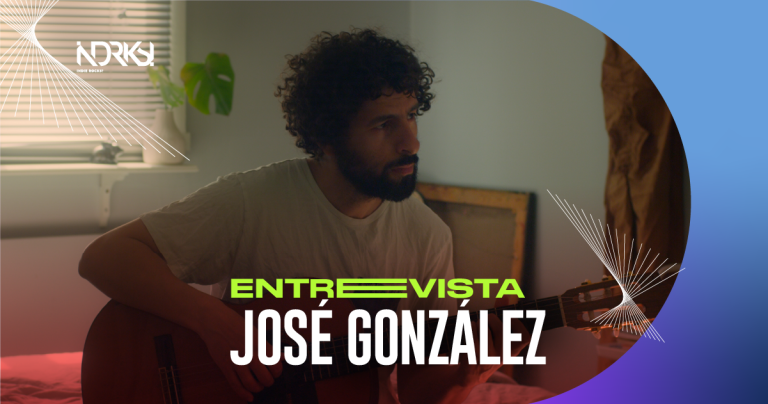The balance between the musician and fiction: A Tiger In Paradise.
With the release of his documentary film A Tiger In Paradise, Jose Gonzalez He faces the polarity of showing an intimate part of his life through fiction. Thus, the feature film becomes a reflection of the ups and downs of the creative process, our connection with the world and the fluidity of ideas. To tell us more about its creation, Jose Gonzalez spoke with Indie Rocks! This is what he told us.
A Tiger In Paradise premieres this December 8 through the MUBI platform in Mexico, after a long tour of festivals, such as the Copenhagen International Film Festival where he performed, shows us a new side of the musician.
Jose Gonzalez He is the first Swedish generation of his family, of Argentine origin, who, since his first album, Veneer, He showed that music can also immerse us in a world of possibilities, help us reflect on our role in front of others or simply embrace us in company. With this documentary directed by Mikel Cee Karlsson, We delve into something more than the day-to-day life of the musician, it is about mental health, creation and a set of observations about reality throughout life.
Starting from the image of mental health, especially psychotic episodes at a specific stage of their life, sets the tone for understanding the background of the creativity of José González. Not all art is born from kindness and creating is also a dark process. Regarding the union between the mental state and music, the singer-songwriter comments:
The thing is that it has been more than 10 years that I have not had mental health problems. On the second disc (In Our Nature) yes it was part of what had happened recently. And so there are some songs that have to do with those events that lasted weeks or even a few months. It’s problematic, but overall I felt like I had two lives, one where I felt totally normal and one where I fell into these psychotic events. So the theme of writing and psychosis is something that I have really tried to keep them separate, it is only from time to time that I have had it as a theme of my music, that I did write thinking about what had happened, but in “Generally, the music comes from one side or the texts come from the other side.”
Thus he shows us in his first paintings the separation of both lives, which sometimes join together and separate in order to regain control. The clear image, which comes from the narration of Jose Gonzalez about its episodes, leads us to the idea that the director wanted to bring to the screen, duality.
And, with this film, Mikel, the director, was very interested in seeing how to bring these two parts of my life together, that’s where we started to see how my personal story could be seen. How the way you see the world can change and how it can be quite wrong from time to time. And relate it as the theme of what is reality and what is fiction at the individual level or at the level of society,” added the musician.
The film does not limit itself to giving us a pastoral and idyllic space, it also delves into the deepest thoughts of its protagonist. Shared questions about something bigger than a single individual, everything that keeps us together, the different experiences that we share or that isolate us and the possibility of achieving the unattainable.
At one point he even Jose Gonzalez His role in music is questioned, how he became the artist we listen to today and if this work was made for him. From his reflection, many artists can identify with the difficulties of the process and the doubts that arise with it. To explain his arrival in music he commented:
For me it has been a matter of trying different things throughout my life. I had ambitions to be a musician when I was young, I wasn’t that successful with bands and I wanted to study. That’s when studying biochemistry I was already quite determined that this was going to be my life, or my professional life, but when I was successful with my first album (Veneer) I could leave it aside.”
With a long process, since prior to his solo work he led the band Junip, He was able to adapt to his own style. His intimate and introspective songs created a different world, connecting with diverse audiences and giving us the albums we know today. A theme that in the film is linked to the ambitions of creating.
The theme that enters the film is the additional ambition, more than making music that people like, it is putting words, concepts in the music, in the lyrics, which have to do with what I want to show the world. , what I want people to know or learn or make them think in different ways. There you would see something that would be another level, that would not know how that project is going. The project of making music continues to work, I play the guitar, some people like the voice and I continue with that,” he said. José González.
Throughout the documentary we will see phrases and concepts, like those pointed out by the musician, that invite us to decipher a fundamental part within his songs. In addition to folk or indie pop sounds, there is a much more extensive conceptual development, which we understand in different scenes of To Tiger To Paradise. We can listen to songs Local Valley, their fourth studio album and inspiration for the film, about the creation of them, Jose Gonzalez comments:
For me it has always been about starting with the sounds, with the guitar, with the arpeggios, the chords, the harmony. And then add your voice, first without words and then with words. Once I start writing words, that’s when I used to get stuck because I didn’t know what to write or I didn’t feel like writing. Over time it has been the part that has evolved into what we show in the film, which has to do with writing. On the one hand, topics that affect too much emotionally, but on the other hand I can introduce concepts or ideas that have a relationship to ideology, ideas that seem interesting or important to me.”
This is what inspired Mikel Cee Karlsson to create the film, to be able to portray something more about the ideas that both share or wish to share with others. What lies behind the songs, in addition to the film, is the will to give birth to new ideas or revisit those that do not abandon.
And that is where the issue of seeing human beings in our time comes in, we are in a time with a lot of change, especially if one looks at the history of 200,000 years, very, very fast things have happened in recent times. There I am interested in seeing how we can see reality in a way where we can solve problems and not cause more problems than we have,” reflected the composer.
Additionally, the documentary gives us a glimpse into the private life of José González, To understand its creation we have to delve into something more than what we can see with the naked eye. It is difficult to show our most vulnerable side, even more so José González, which begins with the depth of your mental state.
It was something that I initially didn’t really want, when we started filming, to show so much of my personal life, but it wasn’t a documentary where we filmed and filmed and then chose. Mikel (the director) decided, ‘well, now we are going to do this scene’, and then I sort of entered into the role of someone who acts and there he felt quite uncomfortable, but the part of semi-fiction. Let’s say I went into the sea to swim, but it wasn’t me, it was to make the film look more dramatic than it is and, then, I felt that what there was was a good balance between who I am and what do we mean with the film. “Everything has been thought out and we have done it together in a way that I feel quite comfortable,” explained the musician.
Thus, the semi-fiction, or the space between reality and fiction, gives rise to what we see in A Tiger In Paradise, a concept from Jose Gonzalez as the protagonist of his own life. This is not the composer’s first collaboration with Mikel Cee Karlsson, They previously worked in The Extraordinary Life Of José González (2010) and in music videos for Local Valley, which gave rise to a deeper connection, something evident in this film.
It was very nice and very natural. He (Mikel Cee Karlsson) suggested that I make videos for all the songs on this fourth album and then he changed the project to do something more personal, but also at the same time with more ambition: with the ambition of playing these themes that interest us. both, themes of sociology, of evolution, of ideologies, of groups. The project was very nice and it was something that, most of the time, he designed the scenes, but he designed them in relation to my previous songs and our talks,” he described. Jose Gonzalez.
In an enigmatic and introspective space, A Tiger In Paradise, available on MUBI.






